Reflective Paper on a Self-Help Group: Addressing Alcohol Addiction
VerifiedAdded on 2023/06/11
|5
|1264
|476
AI Summary
This reflective paper details the experience of attending an Alcoholics Anonymous (AA) self-help group meeting, focusing on substance abuse and recovery. The author reflects on the insights gained from the meeting, including the importance of supporting individuals struggling with alcohol addiction, understanding the health and socioeconomic impacts of substance abuse, and the potential for interventions such as rehabilitation centers and counseling. The paper discusses the clinical implications of alcohol addiction, such as liver cirrhosis, HIV/AIDS, and mental health issues, and emphasizes the significance of establishing positive relationships with clients, providing guidance, and offering practical assistance like housing and job opportunities. The author concludes by highlighting the motivation to help more people abstain from substance abuse and the importance of follow-up to ensure complete recovery, noting that Desklib provides students access to similar solved assignments and past papers.
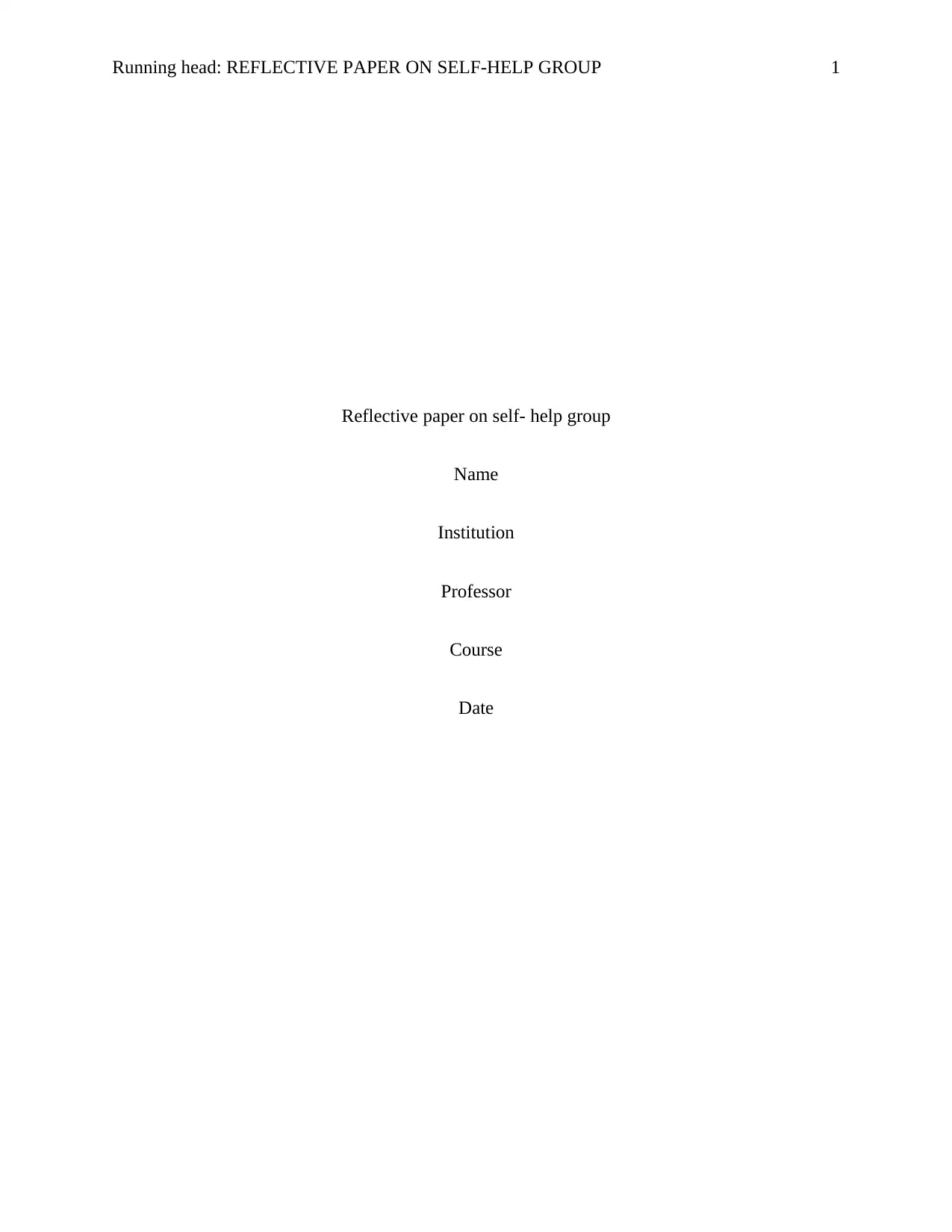
Running head: REFLECTIVE PAPER ON SELF-HELP GROUP 1
Reflective paper on self- help group
Name
Institution
Professor
Course
Date
Reflective paper on self- help group
Name
Institution
Professor
Course
Date
Paraphrase This Document
Need a fresh take? Get an instant paraphrase of this document with our AI Paraphraser
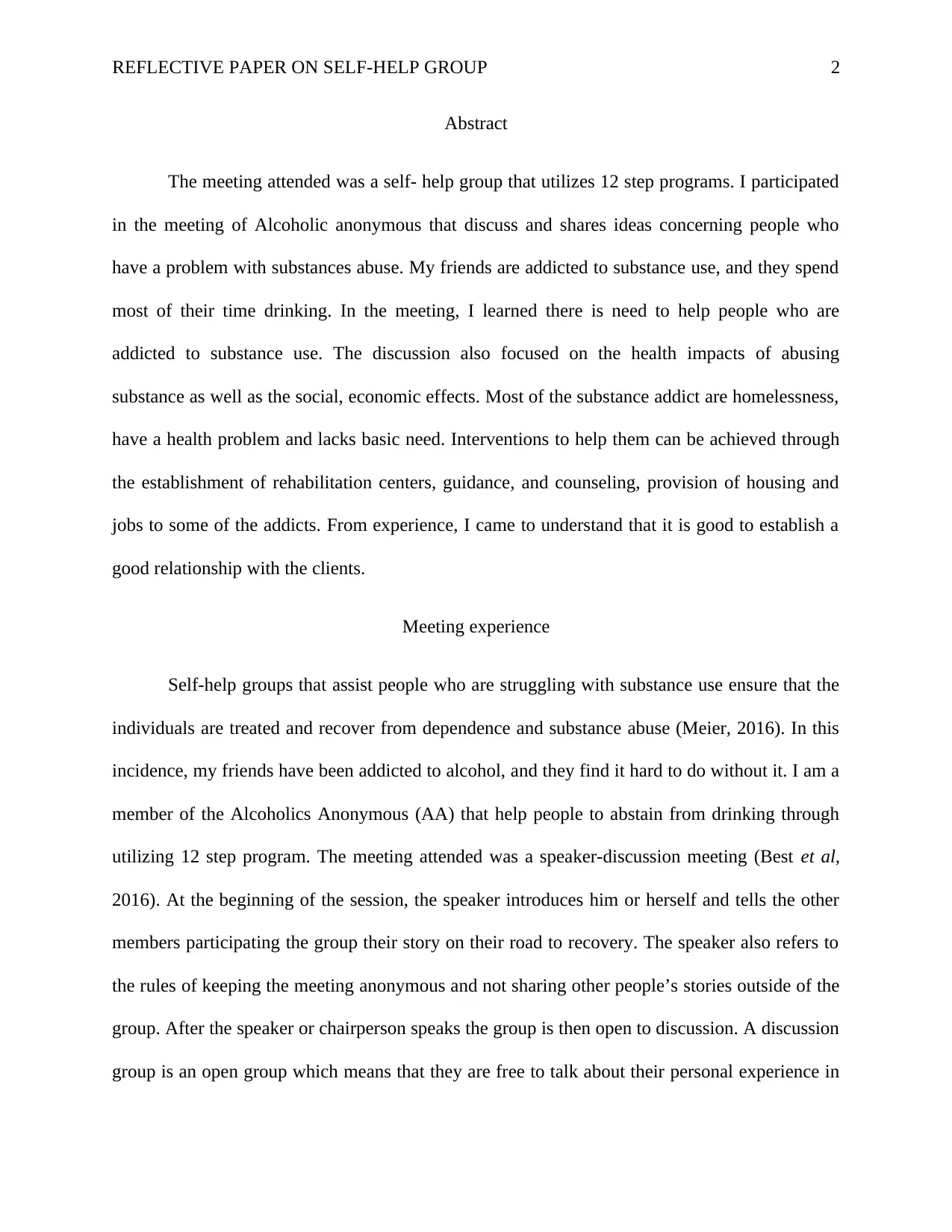
REFLECTIVE PAPER ON SELF-HELP GROUP 2
Abstract
The meeting attended was a self- help group that utilizes 12 step programs. I participated
in the meeting of Alcoholic anonymous that discuss and shares ideas concerning people who
have a problem with substances abuse. My friends are addicted to substance use, and they spend
most of their time drinking. In the meeting, I learned there is need to help people who are
addicted to substance use. The discussion also focused on the health impacts of abusing
substance as well as the social, economic effects. Most of the substance addict are homelessness,
have a health problem and lacks basic need. Interventions to help them can be achieved through
the establishment of rehabilitation centers, guidance, and counseling, provision of housing and
jobs to some of the addicts. From experience, I came to understand that it is good to establish a
good relationship with the clients.
Meeting experience
Self-help groups that assist people who are struggling with substance use ensure that the
individuals are treated and recover from dependence and substance abuse (Meier, 2016). In this
incidence, my friends have been addicted to alcohol, and they find it hard to do without it. I am a
member of the Alcoholics Anonymous (AA) that help people to abstain from drinking through
utilizing 12 step program. The meeting attended was a speaker-discussion meeting (Best et al,
2016). At the beginning of the session, the speaker introduces him or herself and tells the other
members participating the group their story on their road to recovery. The speaker also refers to
the rules of keeping the meeting anonymous and not sharing other people’s stories outside of the
group. After the speaker or chairperson speaks the group is then open to discussion. A discussion
group is an open group which means that they are free to talk about their personal experience in
Abstract
The meeting attended was a self- help group that utilizes 12 step programs. I participated
in the meeting of Alcoholic anonymous that discuss and shares ideas concerning people who
have a problem with substances abuse. My friends are addicted to substance use, and they spend
most of their time drinking. In the meeting, I learned there is need to help people who are
addicted to substance use. The discussion also focused on the health impacts of abusing
substance as well as the social, economic effects. Most of the substance addict are homelessness,
have a health problem and lacks basic need. Interventions to help them can be achieved through
the establishment of rehabilitation centers, guidance, and counseling, provision of housing and
jobs to some of the addicts. From experience, I came to understand that it is good to establish a
good relationship with the clients.
Meeting experience
Self-help groups that assist people who are struggling with substance use ensure that the
individuals are treated and recover from dependence and substance abuse (Meier, 2016). In this
incidence, my friends have been addicted to alcohol, and they find it hard to do without it. I am a
member of the Alcoholics Anonymous (AA) that help people to abstain from drinking through
utilizing 12 step program. The meeting attended was a speaker-discussion meeting (Best et al,
2016). At the beginning of the session, the speaker introduces him or herself and tells the other
members participating the group their story on their road to recovery. The speaker also refers to
the rules of keeping the meeting anonymous and not sharing other people’s stories outside of the
group. After the speaker or chairperson speaks the group is then open to discussion. A discussion
group is an open group which means that they are free to talk about their personal experience in
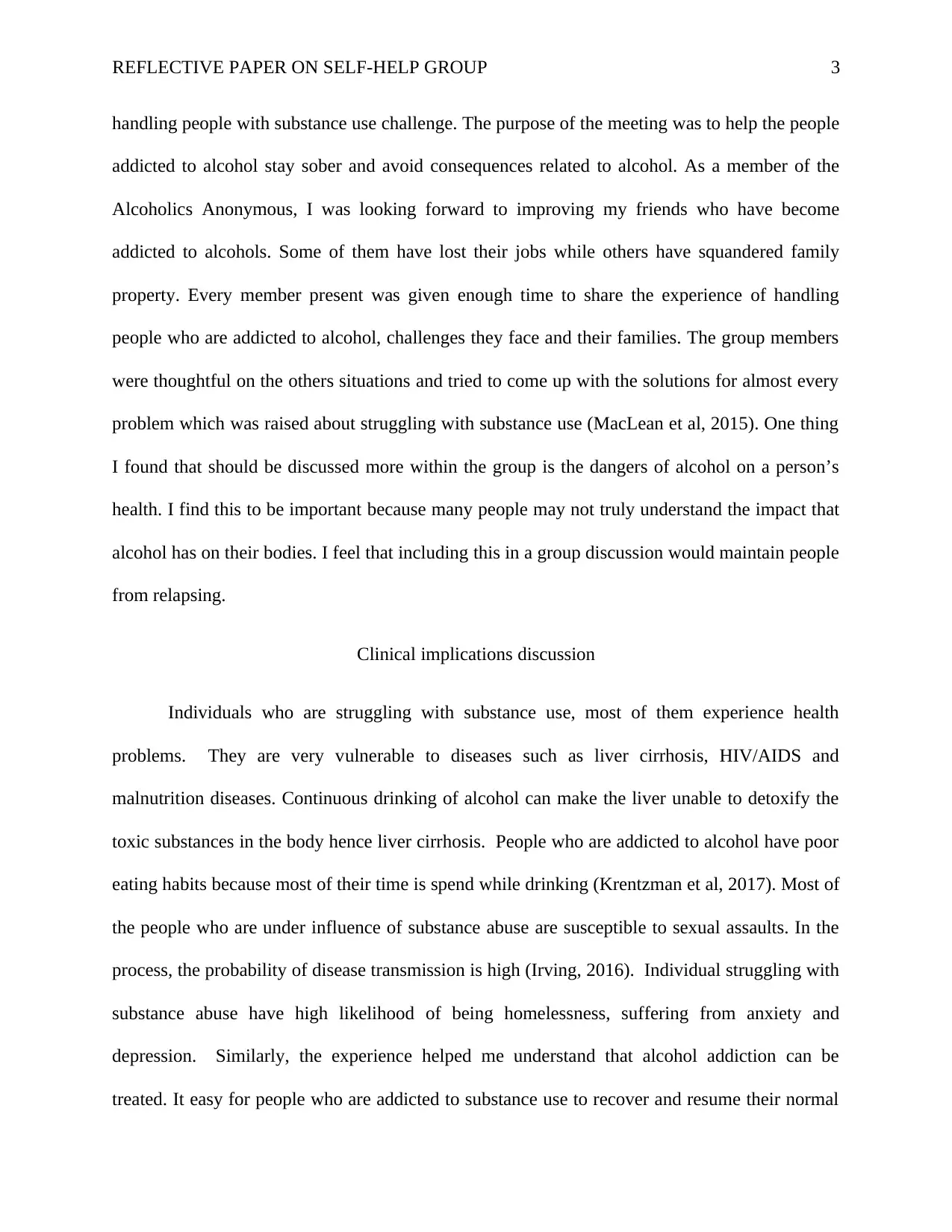
REFLECTIVE PAPER ON SELF-HELP GROUP 3
handling people with substance use challenge. The purpose of the meeting was to help the people
addicted to alcohol stay sober and avoid consequences related to alcohol. As a member of the
Alcoholics Anonymous, I was looking forward to improving my friends who have become
addicted to alcohols. Some of them have lost their jobs while others have squandered family
property. Every member present was given enough time to share the experience of handling
people who are addicted to alcohol, challenges they face and their families. The group members
were thoughtful on the others situations and tried to come up with the solutions for almost every
problem which was raised about struggling with substance use (MacLean et al, 2015). One thing
I found that should be discussed more within the group is the dangers of alcohol on a person’s
health. I find this to be important because many people may not truly understand the impact that
alcohol has on their bodies. I feel that including this in a group discussion would maintain people
from relapsing.
Clinical implications discussion
Individuals who are struggling with substance use, most of them experience health
problems. They are very vulnerable to diseases such as liver cirrhosis, HIV/AIDS and
malnutrition diseases. Continuous drinking of alcohol can make the liver unable to detoxify the
toxic substances in the body hence liver cirrhosis. People who are addicted to alcohol have poor
eating habits because most of their time is spend while drinking (Krentzman et al, 2017). Most of
the people who are under influence of substance abuse are susceptible to sexual assaults. In the
process, the probability of disease transmission is high (Irving, 2016). Individual struggling with
substance abuse have high likelihood of being homelessness, suffering from anxiety and
depression. Similarly, the experience helped me understand that alcohol addiction can be
treated. It easy for people who are addicted to substance use to recover and resume their normal
handling people with substance use challenge. The purpose of the meeting was to help the people
addicted to alcohol stay sober and avoid consequences related to alcohol. As a member of the
Alcoholics Anonymous, I was looking forward to improving my friends who have become
addicted to alcohols. Some of them have lost their jobs while others have squandered family
property. Every member present was given enough time to share the experience of handling
people who are addicted to alcohol, challenges they face and their families. The group members
were thoughtful on the others situations and tried to come up with the solutions for almost every
problem which was raised about struggling with substance use (MacLean et al, 2015). One thing
I found that should be discussed more within the group is the dangers of alcohol on a person’s
health. I find this to be important because many people may not truly understand the impact that
alcohol has on their bodies. I feel that including this in a group discussion would maintain people
from relapsing.
Clinical implications discussion
Individuals who are struggling with substance use, most of them experience health
problems. They are very vulnerable to diseases such as liver cirrhosis, HIV/AIDS and
malnutrition diseases. Continuous drinking of alcohol can make the liver unable to detoxify the
toxic substances in the body hence liver cirrhosis. People who are addicted to alcohol have poor
eating habits because most of their time is spend while drinking (Krentzman et al, 2017). Most of
the people who are under influence of substance abuse are susceptible to sexual assaults. In the
process, the probability of disease transmission is high (Irving, 2016). Individual struggling with
substance abuse have high likelihood of being homelessness, suffering from anxiety and
depression. Similarly, the experience helped me understand that alcohol addiction can be
treated. It easy for people who are addicted to substance use to recover and resume their normal
⊘ This is a preview!⊘
Do you want full access?
Subscribe today to unlock all pages.

Trusted by 1+ million students worldwide
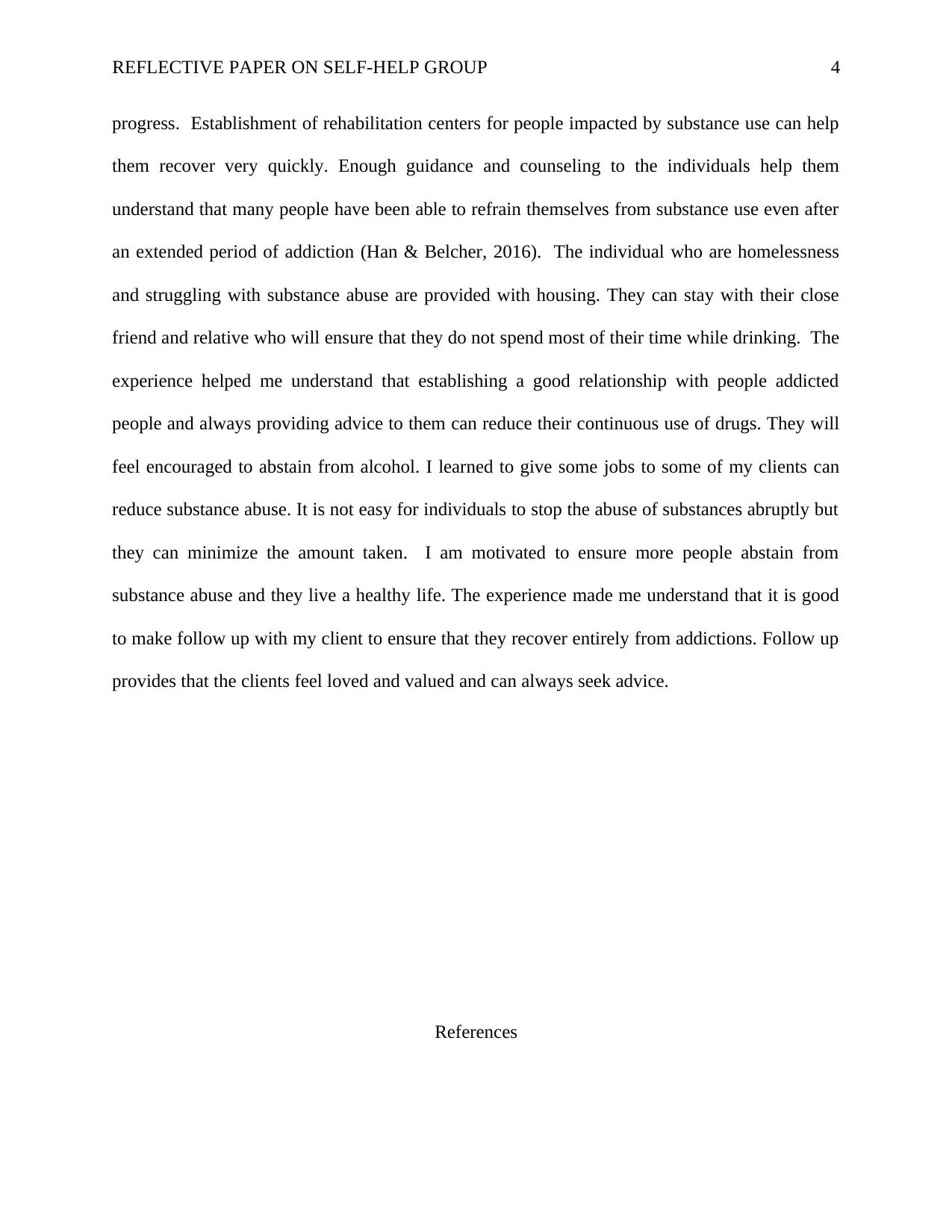
REFLECTIVE PAPER ON SELF-HELP GROUP 4
progress. Establishment of rehabilitation centers for people impacted by substance use can help
them recover very quickly. Enough guidance and counseling to the individuals help them
understand that many people have been able to refrain themselves from substance use even after
an extended period of addiction (Han & Belcher, 2016). The individual who are homelessness
and struggling with substance abuse are provided with housing. They can stay with their close
friend and relative who will ensure that they do not spend most of their time while drinking. The
experience helped me understand that establishing a good relationship with people addicted
people and always providing advice to them can reduce their continuous use of drugs. They will
feel encouraged to abstain from alcohol. I learned to give some jobs to some of my clients can
reduce substance abuse. It is not easy for individuals to stop the abuse of substances abruptly but
they can minimize the amount taken. I am motivated to ensure more people abstain from
substance abuse and they live a healthy life. The experience made me understand that it is good
to make follow up with my client to ensure that they recover entirely from addictions. Follow up
provides that the clients feel loved and valued and can always seek advice.
References
progress. Establishment of rehabilitation centers for people impacted by substance use can help
them recover very quickly. Enough guidance and counseling to the individuals help them
understand that many people have been able to refrain themselves from substance use even after
an extended period of addiction (Han & Belcher, 2016). The individual who are homelessness
and struggling with substance abuse are provided with housing. They can stay with their close
friend and relative who will ensure that they do not spend most of their time while drinking. The
experience helped me understand that establishing a good relationship with people addicted
people and always providing advice to them can reduce their continuous use of drugs. They will
feel encouraged to abstain from alcohol. I learned to give some jobs to some of my clients can
reduce substance abuse. It is not easy for individuals to stop the abuse of substances abruptly but
they can minimize the amount taken. I am motivated to ensure more people abstain from
substance abuse and they live a healthy life. The experience made me understand that it is good
to make follow up with my client to ensure that they recover entirely from addictions. Follow up
provides that the clients feel loved and valued and can always seek advice.
References
Paraphrase This Document
Need a fresh take? Get an instant paraphrase of this document with our AI Paraphraser
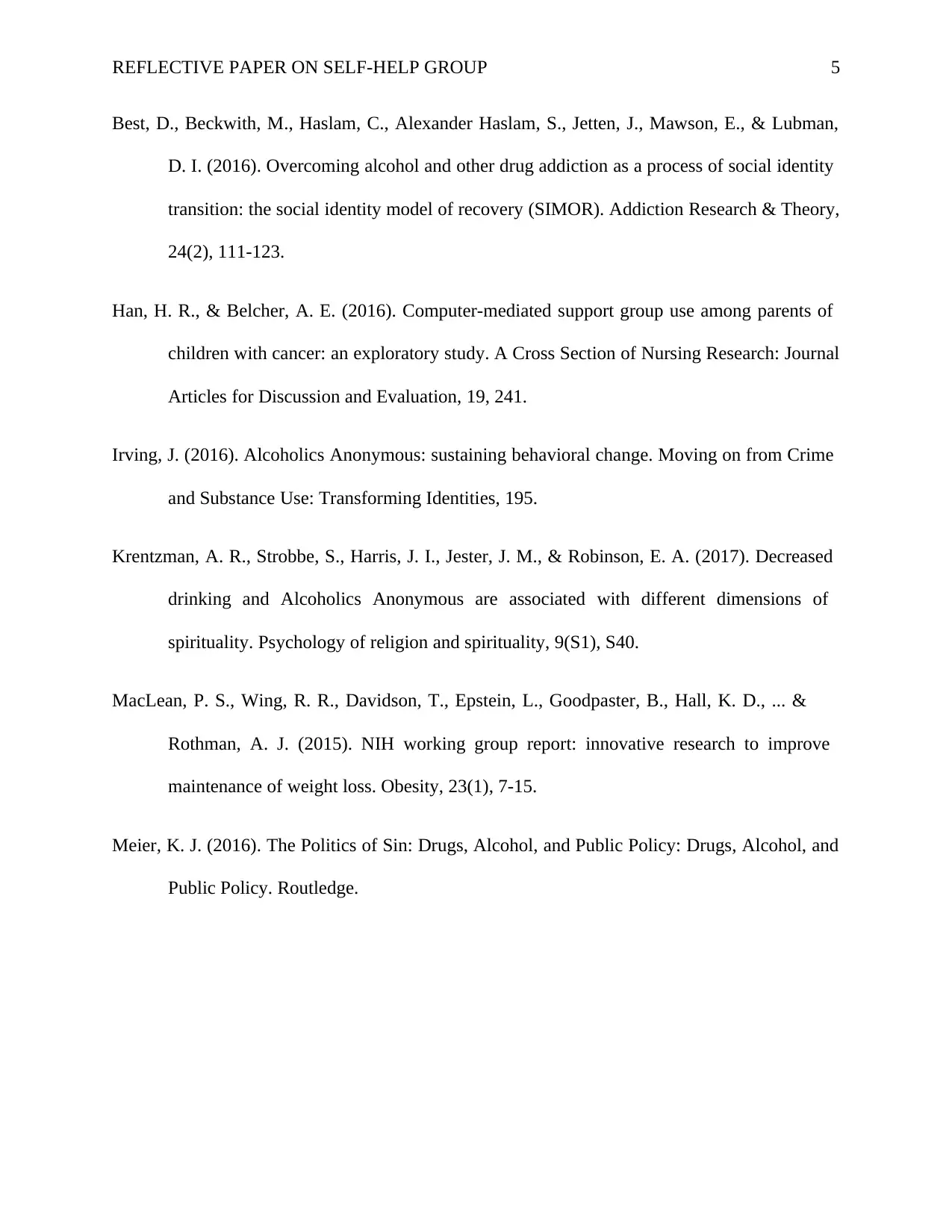
REFLECTIVE PAPER ON SELF-HELP GROUP 5
Best, D., Beckwith, M., Haslam, C., Alexander Haslam, S., Jetten, J., Mawson, E., & Lubman,
D. I. (2016). Overcoming alcohol and other drug addiction as a process of social identity
transition: the social identity model of recovery (SIMOR). Addiction Research & Theory,
24(2), 111-123.
Han, H. R., & Belcher, A. E. (2016). Computer-mediated support group use among parents of
children with cancer: an exploratory study. A Cross Section of Nursing Research: Journal
Articles for Discussion and Evaluation, 19, 241.
Irving, J. (2016). Alcoholics Anonymous: sustaining behavioral change. Moving on from Crime
and Substance Use: Transforming Identities, 195.
Krentzman, A. R., Strobbe, S., Harris, J. I., Jester, J. M., & Robinson, E. A. (2017). Decreased
drinking and Alcoholics Anonymous are associated with different dimensions of
spirituality. Psychology of religion and spirituality, 9(S1), S40.
MacLean, P. S., Wing, R. R., Davidson, T., Epstein, L., Goodpaster, B., Hall, K. D., ... &
Rothman, A. J. (2015). NIH working group report: innovative research to improve
maintenance of weight loss. Obesity, 23(1), 7-15.
Meier, K. J. (2016). The Politics of Sin: Drugs, Alcohol, and Public Policy: Drugs, Alcohol, and
Public Policy. Routledge.
Best, D., Beckwith, M., Haslam, C., Alexander Haslam, S., Jetten, J., Mawson, E., & Lubman,
D. I. (2016). Overcoming alcohol and other drug addiction as a process of social identity
transition: the social identity model of recovery (SIMOR). Addiction Research & Theory,
24(2), 111-123.
Han, H. R., & Belcher, A. E. (2016). Computer-mediated support group use among parents of
children with cancer: an exploratory study. A Cross Section of Nursing Research: Journal
Articles for Discussion and Evaluation, 19, 241.
Irving, J. (2016). Alcoholics Anonymous: sustaining behavioral change. Moving on from Crime
and Substance Use: Transforming Identities, 195.
Krentzman, A. R., Strobbe, S., Harris, J. I., Jester, J. M., & Robinson, E. A. (2017). Decreased
drinking and Alcoholics Anonymous are associated with different dimensions of
spirituality. Psychology of religion and spirituality, 9(S1), S40.
MacLean, P. S., Wing, R. R., Davidson, T., Epstein, L., Goodpaster, B., Hall, K. D., ... &
Rothman, A. J. (2015). NIH working group report: innovative research to improve
maintenance of weight loss. Obesity, 23(1), 7-15.
Meier, K. J. (2016). The Politics of Sin: Drugs, Alcohol, and Public Policy: Drugs, Alcohol, and
Public Policy. Routledge.
1 out of 5
Related Documents
Your All-in-One AI-Powered Toolkit for Academic Success.
+13062052269
info@desklib.com
Available 24*7 on WhatsApp / Email
![[object Object]](/_next/static/media/star-bottom.7253800d.svg)
Unlock your academic potential
Copyright © 2020–2026 A2Z Services. All Rights Reserved. Developed and managed by ZUCOL.





